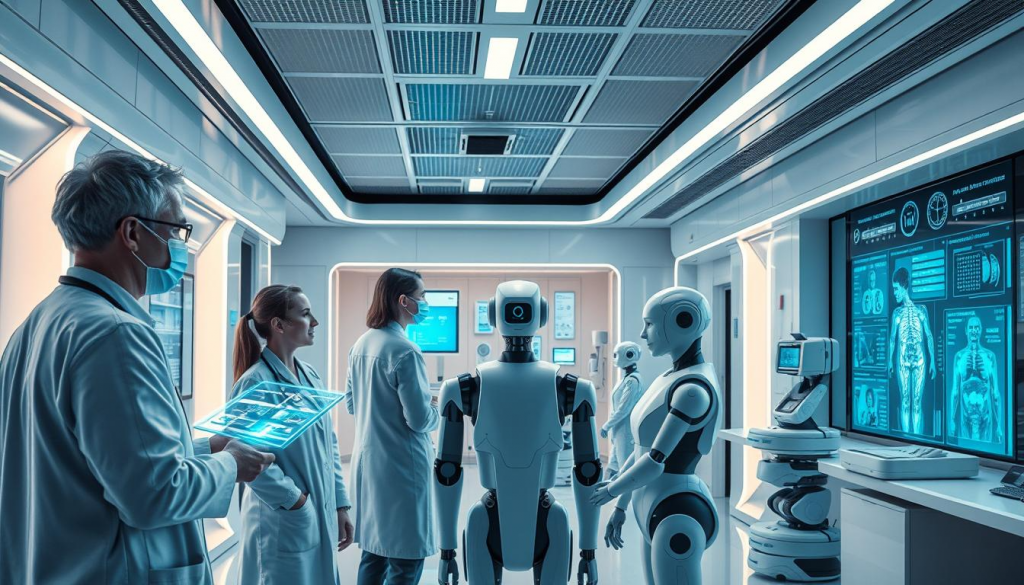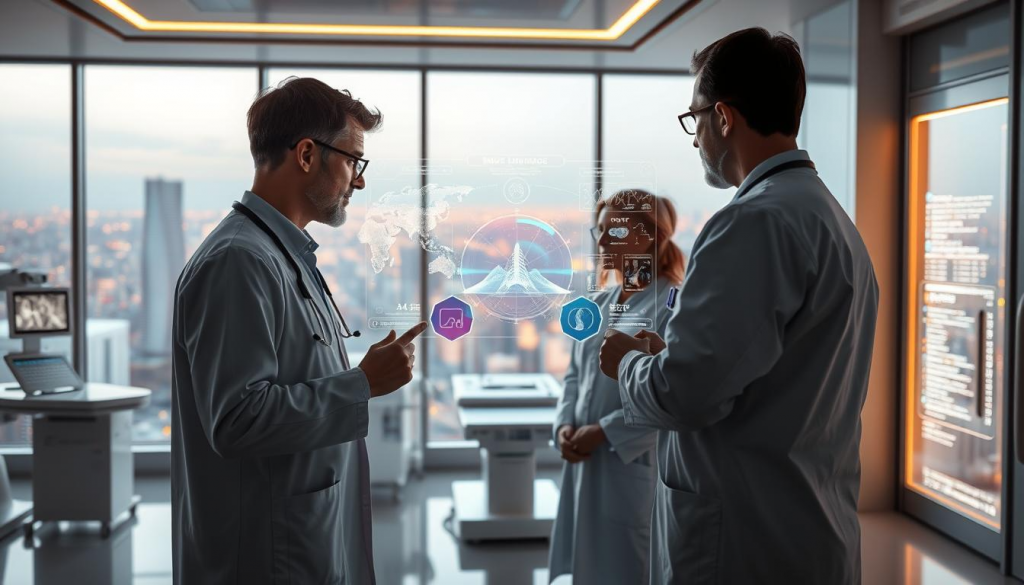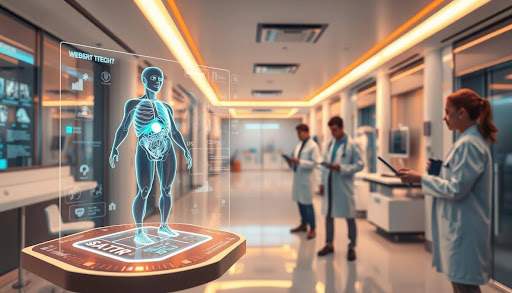Artificial intelligence is transforming the healthcare sector by bringing new solutions that not only enhance patient care but also enhance workflows of medical professionals. By incorporating the AI, healthcare providers now have an opportunity to analyze huge volumes of data and make well-informed decisions, which shorten the time of diagnosis and make the treatment process more effective.
There are extensive applications of AI in healthcare, including predictive analytics and personalized medicine. Using those technologies, medical experts can make more precise diagnosing and treatment to increase the outcomes of patients in the end.
Key Takeaways:
- Its ability to enhance diagnosis and the efficacy of treatment is changing healthcare by making it more effective than before.
- The notable ones are predictive analytics and personalized medicine in healthcare using AI.
- The combination of AI improves care to patients and clinician workflow.
- Massive amounts of data can be analyzed in order to make decisions.
- AI can decrease the time of diagnosis and lead to enhanced treatment results.
The Current State of AI in Healthcare:
The healthcare sector is on the edge of a technological breakthrough, due to the usage of AI. Neural computing, Artificial Intelligence is redefining healthcare by being used to inform diagnosis, treatment planning and even in back office work processes.
Diagnostic Uses and Early Diagnosis:
Medical images and patient data is also being analyzed with AI algorithms, and allow diseases such as cancer to be detected early on. Researchers claim that such AI-based tools will be able to identify breast cancer more accurately than human clinicians. Dr. Jane Smith, one of the most renowned researchers working in the sphere of diagnostics, states that AI is transforming the sphere of diagnostics.
Treatment Planning and Personalized Medicine:
Its application is also in personalizing the treatment given according to individual characteristics of patients and their medical histories. This strategy has proved to be very useful in the enhancement of patient outcomes. An example is that AI can assist with determining which treatment a patient will respond to best regarding his or her genetic makeup.
Efficiency on the Administration and Workflow Optimization:
Virtual assistants and chatbots powered by AI are automating administrative processes, like arranging appointments and handling patient documentation. This not only enhances efficiency, but also ensures fewer workforce is expended by healthcare staff – who can instead concentrate on other more urgent matters.
Healthcare and Technology: The Revolutionary AI Innovations:
Artificial Intelligence in healthcare is transforming the healthcare industry in the way medical practitioners make diagnoses and treat diseased patients. Not only is this technological innovation serving to improve patient care but it is also helping to streamline clinical workflow in clinical environments
Medical imaging advancements in radiology:
At this point, it can be said that AI is hugely enhancing medical imaging and radiology. Using sophisticated algorithms, AI has the ability to identify images more precisely and faster than human radiologists.
To diagnose accurately AI-powered:
Machine-learning-aided tools are cutting down errors associated with image interpretation results in more precise fixes. The technology is especially friendly when used in detection of illness at an early stage such as cancer.
Effort to Steven Otto Reducing Radiologist Workload
With the analysis of routine images being automated, AI is currently reducing the amount of work that radiologists must do and are enabling them to focus on more complex cases.
Predictive Analytics to Outcomes:
Traditional analytic skills continue to develop as we can mention predictive analytics where AI is helping significantly. Aided by AI, one can predict patient outcomes, find the patients who are at risk, and propose preventative interventions based on large datasets.
Remote patient monitoring and Health Assistants:
Patients are being tracked remotely, where they are offered health advice and manage their chronic illnesses, through the use of virtual health assistants. Not only does this increase patient engagement but it also decreases on the number of hospital visits.
| AI Innovation | Benefit | Application |
| Medical Imaging Analysis | Improved Diagnostic Accuracy | Cancer Detection |
| Predictive Analytics | Enhanced Patient Outcomes | Chronic Disease Management |
| Virtual Health Assistants | Remote Patient Monitoring | Post-Discharge Care |

Use of Healthcare Technology AIs At the moment, the technology of AIs is used in many fields of human activity. Healthcare technology is one of them.
Challenges and Ethical considerations:
With AI entering the field of healthcare more and more, a number of ethical considerations emerge. The introduction of AI-powered healthcare applications is reshaping the medical industry therefore it is highly important that the challenges related to this trend should be solved to promote further development and equal access of these tools.

Future of AI in Healthcare:
Artificial Intelligence integration in the healthcare market is about to transform the industry in a new way. The convergence of Healthcare and Technology provides the possibility of general improvement of patient care and the services available in healthcare. Future innovations in AI have the high likelihood to improve diagnosis accuracy, facilitate clinical workflow, and bring better patient outcomes.
Future Healthcare Technology Innovations will be concentrated in the creation of more advanced AI algorithms which can read the intricate health data, draw patterns, and give specific treatment advice. The number of opportunities that AI in healthcare can bring is enormous, and the benefits of engaging in this sector can bring significant returns with regard to patient care and efficiency.
As the field of AI continues to develop, it is important to focus on the issues that arise in its adoption such as the data privacy and security concerns. By doing this we are able to guarantee that healthcare AI benefits are fairly distributed and will contribute to health care system sustainability and effectiveness.
FAQ:
What is the artificial intelligence application in healthcare?
Artificial intelligence is currently implemented in healthcare activities, such as detecting the disease, treatment planning, and the administrative processes of healthcare services which aim to upgrade patient care and improve healthcare delivery.
What are the advantages of AI in medical imaging and radiology?
They are designing algorithms to interpret medical images (e.g., X-rays and MRIs) to speed up the diagnosis of conditions more accurately and reduce the workload on radiologists by up to 90 percent.
Why should AI be used to predict patient outcomes?
Predictive analytics, which relies on AI, assists healthcare professionals in predicting patient outcomes based on the analysis of massive amounts of data and patterns observed and identifying how likely the patient will be readmitted or develop the disease/continue the treatment.
What are the issues of data privacy and security when it comes to AI-driven healthcare?
The health implications of AI deployments are related to the aspects of data privacy and security because patient data will be on the receiving end and stored and analyzed, which comes to the aspect of ensuring their security against data loss and unauthorized usage.
What has to be done to ensure that AI-powered healthcare solutions are equally available?
To ensure equal access to AI-driven healthcare technologies, one should deal with the challenges of healthcare disparities and access to health services, infrastructure, and technological access, along with the policies that would facilitate equal access to AI-based healthcare technologies.
What is healthcare AI of the future?
The future of all these is in the realm of innovation and investment, in AI technology, of further enhancements of care to patients, assistance with streamlining healthcare services, and improvement of the precision of diagnosis.
What will be the effect of AI on the workplace of healthcare professionals?
It is also likely to increase the role of healthcare experts by relieving them of administrative duties and endowing them with more complicated and substantial tasks, i.e., caring about patients and decision-making.
What are the roadblocks of connecting AI to current healthcare systems?
The integration of newer systems with existing healthcare systems is challenging in terms of interoperability, data standardization, compatibility, and alignment to existing infrastructure, and concerns relating to data quality and bias.


